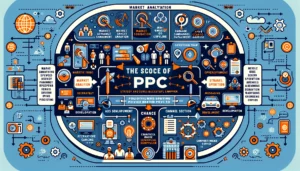Unveiling the Costs: What Agencies Typically Charge for PPC Services

How much does an agency charge for PPC? In the competitive digital marketing landscape, understanding the costs associated with pay-per-click (PPC) services is crucial for brands aiming to maximise their online advertising efforts.
This article delves into the typical charges levied by agencies for PPC services, examining pricing structures, service scopes, comparisons with other digital marketing services, and strategies to enhance PPC investments. It also offers insights into selecting the right PPC agency to foster a successful partnership.
Key Takeaways
- PPC service pricing varies widely, with agencies offering different models such as percentage of spend, flat fees, or performance-based charges.
- The cost of PPC services is influenced by factors such as campaign complexity, keyword competition, and the level of expertise of the agency.
- PPC services encompass a range of activities including campaign strategy, keyword research, bid management, and ongoing optimisation.
- When compared to other digital marketing services like SEO, PPC offers quicker visibility but may require a higher investment for sustained results.
- Choosing the right PPC agency involves understanding their credentials, and success metrics, and ensuring they align with your business’s goals and communication style.
How much does an agency charge for PPC? Understanding PPC Service Pricing Structures
Different Models of PPC Management Fees
When you’re venturing into the realm of PPC, understanding the fee structures agencies employ is crucial. Agencies typically offer several pricing models, each with its own set of advantages and considerations. The most common include a flat fee, percentage of ad spend, performance-based, and hybrid models.
- Flat Fee: A predetermined amount paid monthly, regardless of ad spend.
- Percentage of Ad Spend: A variable fee based on the total ad spend.
- Performance-Based: Fees contingent on achieving specific metrics.
- Hybrid: A combination of any of the above.
- Retainer: A moving amount depending on the level of spend through the account.
Factors such as the size of your campaigns, the level of service required, and the agency’s expertise will influence which model suits your business best. For instance, a flat fee might be more predictable for budgeting, but a performance-based model could align the agency’s incentives with your success.
It’s essential to weigh the pros and cons of each model against your business objectives and PPC goals.
Remember, when asking how much an agency charges for PPC that the right model for one brand may not be the best for another. Open dialogue with potential agencies will help you understand the nuances of their pricing and what you can expect in terms of service and results.
Factors Influencing PPC Service Costs
When you’re delving into the world of PPC, understanding the factors that influence service costs is crucial. The industry and competition level are significant determinants of your PPC expenses. A highly competitive sector may drive up the cost per click (CPC), requiring a larger budget to make an impact. Additionally, the geographical target of your campaign can affect costs, as advertising in high-demand locations often comes at a premium.
- Industry and Competition: High competition can lead to increased CPC.
- Geographic Targeting: Costs vary by location and market demand.
- Ad Quality and Relevance: Higher quality scores can reduce costs.
- Keyword Selection: Broad vs. specific keywords influence budget allocation.
Remember, the complexity of your campaign also plays a role. More intricate campaigns with numerous ad groups and tailored landing pages will necessitate more management time, thus increasing agency fees. Conversely, a straightforward campaign with a clear focus may be more cost-effective.
Selecting the right keywords and crafting ads that resonate with your audience are also pivotal. Agencies may charge more for extensive keyword research and the creation of high-quality, relevant ads that achieve better quality scores and lower CPCs. It’s essential to balance your budget with the potential for a high return on investment (ROI), making informed decisions based on data and expert advice.
Negotiating Terms with PPC Agencies: How much do PPC agencies charge?
When you’re ready to partner with a PPC agency, it’s crucial to enter negotiations with a clear understanding of your goals and budget. Be prepared to discuss your expectations and seek clarity on all terms of service. A PPC ad agency will typically offer a range of pricing models, and it’s important to choose one that aligns with your business objectives.
Transparency is key in any negotiation. Ensure that the PPC eCommerce agency provides a detailed breakdown of costs and services, so there are no surprises down the line.
Consider these factors when negotiating:
- The scope of services offered
- Performance metrics and reporting frequency
- Contract length and termination clauses
- Ownership of ad creatives and accounts post-engagement
Remember, the goal is to establish a partnership that fosters growth and delivers results. Don’t hesitate to ask for case studies or references to gauge the agency’s track record. A successful negotiation will lay the foundation for a productive and mutually beneficial relationship.
The Scope of PPC Services: What You’re Paying For
Campaign Strategy and Development
When you invest in PPC services, you’re not just paying for ads. You’re paying for a comprehensive campaign strategy and development process that can significantly impact your business’s online presence. Developing a robust PPC campaign strategy is crucial; it involves understanding your market, defining your target audience, and crafting messages that resonate with potential customers.
- Market Analysis: Identifying trends and opportunities.
- Audience Segmentation: Tailoring messages to specific groups.
- Message Development: Creating compelling ad copy.
- Channel Selection: Choosing the right platforms for your ads.
Remember, a well-defined strategy is the backbone of any successful PPC campaign. It ensures that every dollar you spend is targeted towards achieving your business goals.
Selecting the right keywords and setting up your campaigns requires meticulous planning and continuous refinement. It’s not just about launching campaigns; it’s about developing a strategy that evolves with your business and the digital landscape. Your agency should provide you with a roadmap that outlines how your campaigns will be structured, monitored, and optimised over time.
Keyword Research and Bid Management
When diving into the world of Google ads PPC, it’s crucial to understand that keyword research and bid management are the bedrock of a successful campaign. Your ability to identify high-value keywords can make or break your PPC efforts, especially in competitive markets. For eCommerce ppc, this becomes even more critical as the right keywords can drive conversions and sales.
- Initial keyword discovery: Identifying potential keywords based on your products, services, and market.
- Competitive analysis: Assessing the keywords your competitors are targeting.
- Keyword refinement: Narrowing down the list to the most effective keywords for your campaign.
- Bid strategy development: Setting up bids based on keyword competition and your budget.
Remember, effective bid management is not a set-and-forget process. It requires continuous monitoring and adjustment to ensure that your Google Adwords PPC campaigns remain competitive and cost-efficient. By regularly analysing performance data, you can refine your bids and strategies to maximise ROI.
Monitoring, Reporting, and Optimisation
In the dynamic world of PPC, continuous monitoring, reporting, and optimisation are the cornerstones of success. Your ability to adapt and refine your campaigns is as crucial as the initial setup. Regular PPC audits are essential to ensure that your investment is yielding the desired results and to identify areas for improvement.
Optimisation is not a one-time task but a perpetual cycle of analysis and adjustment. It’s about finding what works, scaling it, and identifying what doesn’t to either adjust or pause.
Consider the following aspects as part of your ongoing PPC management:
- Performance Analysis: Reviewing key metrics to gauge campaign effectiveness.
- Adjustment of Bids: Modifying bids to maximise ROI.
- A/B Testing: Experimenting with different ad elements to improve engagement.
- Search Query Reports: Analysing search terms to refine keyword targeting.
- Conversion Tracking: Measuring the actions that matter most to your business.
By investing in these areas, you not only maintain the health of your PPC campaigns but also set the stage for increased profitability and market competitiveness.
Comparing PPC to Other Digital Marketing Services
PPC vs. SEO: Cost and Effectiveness
When you’re weighing the options between PPC and SEO, it’s crucial to consider both cost and effectiveness. PPC offers immediate visibility and can generate quick results, but it requires a continuous investment; the moment you stop paying, your ads disappear. SEO, on the other hand, demands patience and consistent effort, yet it builds a lasting organic presence that doesn’t vanish with the cessation of funding.
SEO may seem cost-effective in the long run, but it’s a complex game of content creation, backlink acquisition, and on-page optimisation that can take months, if not years, to mature. PPC campaigns can be adjusted on the fly, allowing for rapid response to market changes or business needs.
The key is to strike a balance between the two, leveraging the quick wins of PPC while investing in the long-term equity of SEO.
Consider the following points when deciding between PPC and SEO for your digital marketing strategy:
- PPC is ideal for immediate results, product launches, or promotions.
- SEO is a long-term strategy that builds credibility and organic reach.
- The cost of PPC is directly tied to your budget and bidding strategy.
- SEO costs are less predictable and can vary based on competition and algorithm changes.
Ultimately, your choice should align with your business goals, target audience, and marketing budget. A nuanced understanding of both PPC and SEO will empower you to make an informed decision that maximises your digital marketing investment.
Integrating PPC with Social Media and Email Marketing
When you blend PPC with social media and email marketing, you’re not just combining forces; you’re creating a cohesive digital marketing ecosystem. Each channel amplifies the other, enhancing your brand’s visibility and engagement across the digital landscape.
Consider this: social media platforms offer a space for your brand to connect with audiences in a more informal, interactive way. By integrating PPC campaigns here, you can capitalise on this engagement, driving targeted traffic to your landing pages. Meanwhile, email marketing allows for personalised communication with your subscribers, nurturing leads that can be effectively retargeted through PPC ads.
To maximise the synergy between these channels, ensure that your messaging is consistent and that your campaigns are strategically aligned.
Remember, the key to a successful integration lies in understanding the unique strengths and audience behaviours of each platform. Here’s a simple breakdown:
- Social Media: Ideal for brand awareness and community engagement.
- Email Marketing: Perfect for lead nurturing and customer retention.
- PPC: Best for immediate traffic and conversion tracking.
When to Choose PPC Over Other Advertising Methods
Deciding when to invest in PPC over other digital marketing methods hinges on your specific goals and the immediacy of your needs. PPC offers rapid visibility and traffic, which is crucial when launching new products or targeting time-sensitive promotions. Unlike SEO, which builds over time, PPC can provide immediate results, making it ideal for testing new markets or messages.
How much does an agency charge for PPC? Consider PPC when:
- You need quick results and cannot wait for organic growth.
- You’re targeting highly competitive keywords where SEO may take longer to rank.
- You have a time-bound promotion or event that requires instant visibility.
- You’re looking to complement your existing SEO efforts with immediate traffic.
Remember, while PPC can offer quick wins, it’s essential to balance short-term gains with long-term strategies like SEO for sustained success.
Selecting PPC should be a strategic decision based on a clear understanding of your market and objectives. It’s not just about the speed of results but also the precision in targeting and the flexibility to adjust campaigns in real-time. A well-executed PPC campaign can not only drive immediate traffic but also provide valuable data to refine your overall marketing strategy.
Maximising Your PPC Investment
Identifying High-Value Keywords and Ad Placements
To maximise your PPC investment, it’s crucial to identify high-value keywords and ad placements that will drive the most qualified traffic to your site. Start by analyzing your target audience’s search behaviour and preferences. Use tools like Google’s Keyword Planner or industry-specific platforms to uncover the terms your potential customers are using.
Competition for keywords can be fierce, and the cost per click (CPC) can vary significantly. To ensure you’re making informed decisions, consider the following factors:
- Search volume: How many people are looking for this keyword?
- Relevance: Does the keyword align with your product or service?
- Intent: Are searchers looking to buy, or just seeking information?
By focusing on keywords with high commercial intent and lower competition, you can achieve a better ROI on your PPC campaigns.
Ad placements are equally important. Whether it’s on search engines, social media platforms, or partner websites, the location of your ads can make a huge difference in performance. Test different placements and monitor the results closely to find the sweet spots that convert the most leads into customers.
Leveraging AI and Automation for Better ROI can affect how much an agency will charge for PPC?
In the dynamic world of PPC, artificial intelligence (AI) and automation are not just buzzwords—they are essential tools that can significantly enhance your return on investment (ROI). AI-driven algorithms can predict click-through rates and optimise bids in real-time, ensuring that your ads are shown to the right audience at the optimal cost. Automation takes the grunt work out of campaign management, freeing you to focus on strategy and creative elements.
By integrating AI and automation into your PPC campaigns, you can achieve a level of efficiency and precision that is simply not possible with manual processes.
Consider these key applications of AI and automation in PPC:
- Predictive analytics for forecasting campaign performance
- Automated bid management for cost-effective ad placements
- Real-time adjustments to campaigns based on user behaviour and conversion data
- Advanced targeting using machine learning to identify and reach potential customers
Embracing these technologies will not only save you time but also improve the performance of your campaigns. As you navigate the complexities of PPC, remember that the goal is to work smarter, not harder. AI and automation are your allies in this endeavour, providing insights and actions at a speed and scale that humans alone cannot match.
Tracking Performance and Adjusting Strategies
In the dynamic landscape of PPC management, vigilance is your ally. Regularly tracking performance is crucial; it allows you to pivot swiftly, capitalising on what works and discarding what doesn’t. A Google ads audit can be a revelation, uncovering inefficiencies and opportunities alike. Consider these key performance indicators (KPIs):
- Click-through rate (CTR)
- Conversion rate
- Quality score
- Cost per conversion
By analysing these metrics, you can fine-tune your campaigns for optimal performance. Adjusting strategies isn’t just about reacting to data; it’s about proactively seeking ways to improve and stay ahead of the competition.
How much does an agency charge for PPC? Remember, the PPC landscape is not static. New trends emerge, consumer behaviours shift, and platforms update their algorithms. Stay informed and be ready to adapt your strategies accordingly. Your agility in this process can make the difference between a good ROI and a great one.
Navigating the PPC Agency Landscape
Selecting the Right PPC Partner for Your Business
When you’re on the hunt for a PPC agency, the sheer number of options can be overwhelming. It’s crucial to find a partner that not only understands your market but also has the expertise to navigate it effectively. A London PPC agency might be the perfect fit if you’re targeting a UK-based audience, offering localised insights that can be invaluable. On the other hand, Google ads agencies specialise in maximising your visibility on the world’s largest search engine, which could be a game-changer for your online presence.
Consider agencies that provide a comprehensive suite of services. For instance, you might encounter a PPC agency offering services for eCommerce, Amazon Ads, comparison shopping, SEM, feed optimisation, interest-based marketing, and helping businesses with maxed-out PPC accounts. This versatility ensures that your chosen agency can adapt to your evolving needs and the dynamic digital landscape.
It’s not just about the services offered, but also about the synergy between your business goals and the agency’s approach. The right partnership can amplify your PPC efforts and drive substantial growth.
Finally, don’t overlook the importance of Google advertising agencies that stay ahead of the curve with the latest trends and technologies. They can provide strategic insights and innovative solutions that set your campaigns apart from the competition. Here’s a quick checklist to help you evaluate potential partners:
Understanding Agency Credentials and Success Metrics
When selecting a PPC partner, it’s crucial to assess their credentials and the metrics they use to gauge success. Look beyond the surface of glossy testimonials and delve into the hard data that reflects their performance. Agencies should be transparent about their certifications, such as Google Partner status, and their expertise in various PPC platforms.
Experience is a subtle yet powerful indicator of an agency’s capability. Inquire about the industries they’ve served and the scale of campaigns they’ve managed. A diverse portfolio can suggest a robust understanding of different market dynamics.
Remember, the most telling sign of an agency’s success isn’t just in the numbers they achieve, but in the consistency and growth they maintain over time.
Consider the following when evaluating success metrics:
- Conversion rates and the cost per acquisition (CPA)
- Return on ad spend (ROAS)
- Click-through rates (CTR) and quality score
Each metric offers insight into different aspects of PPC performance. A proficient agency will not only track these metrics but will also interpret them to continually refine your campaigns for optimal results.
Maintaining a Productive Agency-Client Relationship (How much does an agency charge for PPC?)
To maintain a productive relationship with your PPC agency, clear communication and mutual understanding are paramount. Establish regular check-ins to discuss campaign progress, adjustments, and results. Ensure that both parties are aligned on goals and expectations from the outset to avoid misunderstandings. A collaborative approach fosters a sense of partnership, where your agency is as invested in your success as you are.
Transparency is key. Request detailed reports and analyses to gain insights into how your budget is being utilised and what returns it’s generating. This not only holds the agency accountable but also empowers you with knowledge about your campaigns.
Understanding the full spectrum of services offered by your agency is crucial. They may specialise in areas beyond traditional PPC, such as eCommerce marketing, Amazon ads, and feed optimisation. Here’s a quick checklist to ensure you’re leveraging their full expertise:
- Inquire about their experience with interest-based marketing and comparison shopping.
- Ask how they can assist with SEM and feed optimisation.
- Determine if they have strategies for managing PPC accounts effectively.
Remember, a successful agency-client relationship is built on trust, regular communication, and a shared vision for achieving your marketing objectives.
Conclusion on “How much does an agency charge for PPC?”
In the intricate tapestry of digital marketing, PPC services stand out as a vital thread for businesses seeking immediate visibility and targeted reach. Understanding the typical costs associated with these services is crucial for companies to budget effectively and maximise their return on investment.
While the pricing models may vary, ranging from percentage-based fees to flat rates or performance-driven structures, the key is to find an agency that aligns with your business goals and offers transparency in their billing. As we’ve explored the landscape of PPC charges, remember that the cheapest option isn’t always the best. Investing in a reputable agency with a proven track record can lead to more effective campaigns and, ultimately, greater success in your digital endeavours.
Frequently Asked Questions for How much does an agency charge for PPC?
How do PPC agencies typically structure their management fees?
PPC agencies often use various pricing models including percentage of ad spend, flat fee, performance-based, or a hybrid approach, taking into account the complexity and scale of the campaigns they manage.
What factors can influence the costs of PPC services?
Several factors can influence PPC service costs, such as the industry’s competitiveness, ad platform used, campaign size, keyword difficulty, geographic targeting, and the level of service required.
Is PPC more expensive than SEO?
PPC can be more expensive in the short term due to direct costs per click, but it offers immediate visibility. SEO often requires a longer-term investment but can provide more sustainable, organic traffic over time.
How can AI and automation improve PPC ROI?
AI and automation can improve PPC ROI by optimising keyword bids in real-time, personalising ad copy, and efficiently allocating budgets across campaigns to maximise conversions and minimise costs.
What should I look for when choosing a PPC agency?
When selecting a PPC agency, consider their experience, client testimonials, industry specialisation, transparency in reporting, and their ability to align with your business goals and budget.
Can PPC work effectively in conjunction with other digital marketing services?
Yes, PPC can be highly effective when integrated with other digital marketing services like SEO, social media marketing, and email marketing, creating a comprehensive online presence and reaching audiences at multiple touchpoints.
Author
Search Blog
Free PPC Audit
Subscribe to our Newsletter
The Voices of Our Success: Your Words, Our Pride
Don't just take our word for it. With over 100+ five-star reviews, we let our work-and our satisfied clients-speak for us.
"We have been working with PPC Geeks for around 6 months and have found Mark and the team to be very impressive. Having worked with a few companies in this and similar sectors, I rate PPC Geeks as the strongest I have come across. They have taken time to understand our business, our market and competitors and supported us to devise a strategy to generate business. I value the expertise Mark and his team provide and trust them to make the best recommendations for the long-term."
~ Just Go, Alasdair Anderson




